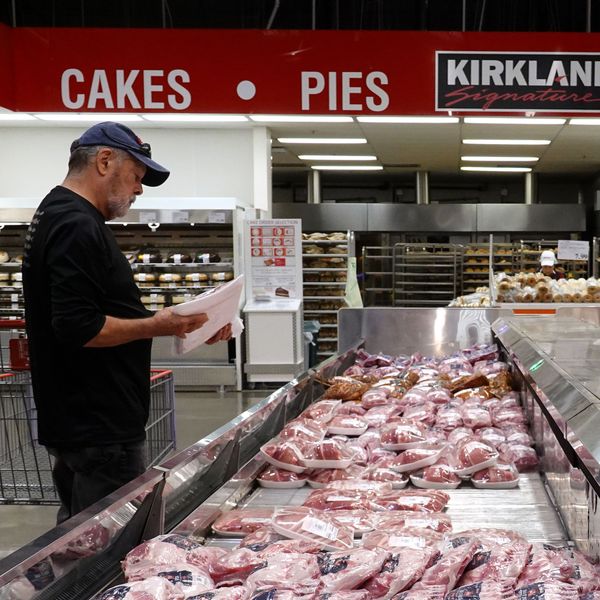To Truly Fix Food System, the Farm Bill Should Restore Fair Markets
The Farm Bill debate is currently in full-swing in the U.S. Senate this week. The sprawling legislation covers food stamps, subsidies, international food aid, research grants -- it literally dictates what and how we eat. And right now, the Farm Bill gives all the power to the biggest food companies, which they wield with impunity over farmers and consumers.
The Farm Bill debate is currently in full-swing in the U.S. Senate this week. The sprawling legislation covers food stamps, subsidies, international food aid, research grants -- it literally dictates what and how we eat. And right now, the Farm Bill gives all the power to the biggest food companies, which they wield with impunity over farmers and consumers. But an amendment to the bill - the Packer Ban, introduced by Senators Chuck Grassley (R-Iowa) and Kent Conrad (D-North Dakota) - could begin to address this unfair advantage that giant food companies have over farmers.

A tiny number of corporations sit between fewer than a million full-time farmers and 300 million eaters. Only a handful of companies sell seeds and fertilizer to farmers, buy their crops and livestock, process the fruits of farmers' labor into manufactured food, and sell it at a declining number of gigantic supermarket chains. Those that sell supplies and equipment charge farmers high prices. Meanwhile, the processors and meatpackers that buy from farmers pay low, and consumers see a smaller number of choices at often-higher prices at the grocery store.
The lack of competition is especially severe in livestock markets where, between 2000 and 2010, the United States lost 89,000 beef cattle operations (more than 10 percent) and 19,000 hog operations (about 20 percent). Just four companies dominate meat processing in the Unites States, controlling 80 percent of the marketplace. With few buyers, farmers rarely get a competitive price for their livestock. At the local level, there are often only one or two meatpackers buying livestock and often times both companies are represented by the same person, making it impossible for a farmer to negotiate a fair price.
Meatpackers increasingly own their own cattle in order to manipulate the market. The companies buy livestock on the open market when prices are low but slaughter their own livestock when bidding prices rise. This puts long-term, downward pressure on the price of livestock and allows meatpackers to manipulate what farmers and ranchers earn. These persistently low livestock prices effectively work to push small and medium-sized farmers out of business, while still leading to increased consumer food prices because large meatpackers don't face enough competition to force them to pass on savings to consumers.
The Senate's version of the bill retreats from the gains made in the 2008 Farm Bill to ensure that livestock farmers receive fairer prices for their cattle and hogs. However, the Packer Ban would prevent the biggest meatpacking companies from meddling with livestock prices paid to farmers by prohibiting meatpackers from holding livestock for more than a few weeks before they are slaughtered.
Unfortunately, Agriculture Committee Chair Senator Debbie Stabenow has already committed to opposing this sensible livestock marketing reform. On May 3, while briefing a group of 50 farmers, consumers and other stakeholders about the Senate Farm Bill, Senator Stabenow said that she would vote against the Packer Ban (and any other amendments) on the Senate floor.
Stabenow's unwillingness to vote in favor of this amendment is disappointing, but other Senators have the chance to do the right thing - support farmers and consumers and vote for the packer ban amendment. A packer ban would start to level the playing field between livestock producers and meatpackers and help ensure that farmers get fair prices for their hogs and cattle. Let your legislators know you want them to get behind the Packer Ban to restore fairness to our food supply.
An Urgent Message From Our Co-Founder
Dear Common Dreams reader, The U.S. is on a fast track to authoritarianism like nothing I've ever seen. Meanwhile, corporate news outlets are utterly capitulating to Trump, twisting their coverage to avoid drawing his ire while lining up to stuff cash in his pockets. That's why I believe that Common Dreams is doing the best and most consequential reporting that we've ever done. Our small but mighty team is a progressive reporting powerhouse, covering the news every day that the corporate media never will. Our mission has always been simple: To inform. To inspire. And to ignite change for the common good. Now here's the key piece that I want all our readers to understand: None of this would be possible without your financial support. That's not just some fundraising cliche. It's the absolute and literal truth. We don't accept corporate advertising and never will. We don't have a paywall because we don't think people should be blocked from critical news based on their ability to pay. Everything we do is funded by the donations of readers like you. Will you donate now to help power the nonprofit, independent reporting of Common Dreams? Thank you for being a vital member of our community. Together, we can keep independent journalism alive when it’s needed most. - Craig Brown, Co-founder |
The Farm Bill debate is currently in full-swing in the U.S. Senate this week. The sprawling legislation covers food stamps, subsidies, international food aid, research grants -- it literally dictates what and how we eat. And right now, the Farm Bill gives all the power to the biggest food companies, which they wield with impunity over farmers and consumers. But an amendment to the bill - the Packer Ban, introduced by Senators Chuck Grassley (R-Iowa) and Kent Conrad (D-North Dakota) - could begin to address this unfair advantage that giant food companies have over farmers.

A tiny number of corporations sit between fewer than a million full-time farmers and 300 million eaters. Only a handful of companies sell seeds and fertilizer to farmers, buy their crops and livestock, process the fruits of farmers' labor into manufactured food, and sell it at a declining number of gigantic supermarket chains. Those that sell supplies and equipment charge farmers high prices. Meanwhile, the processors and meatpackers that buy from farmers pay low, and consumers see a smaller number of choices at often-higher prices at the grocery store.
The lack of competition is especially severe in livestock markets where, between 2000 and 2010, the United States lost 89,000 beef cattle operations (more than 10 percent) and 19,000 hog operations (about 20 percent). Just four companies dominate meat processing in the Unites States, controlling 80 percent of the marketplace. With few buyers, farmers rarely get a competitive price for their livestock. At the local level, there are often only one or two meatpackers buying livestock and often times both companies are represented by the same person, making it impossible for a farmer to negotiate a fair price.
Meatpackers increasingly own their own cattle in order to manipulate the market. The companies buy livestock on the open market when prices are low but slaughter their own livestock when bidding prices rise. This puts long-term, downward pressure on the price of livestock and allows meatpackers to manipulate what farmers and ranchers earn. These persistently low livestock prices effectively work to push small and medium-sized farmers out of business, while still leading to increased consumer food prices because large meatpackers don't face enough competition to force them to pass on savings to consumers.
The Senate's version of the bill retreats from the gains made in the 2008 Farm Bill to ensure that livestock farmers receive fairer prices for their cattle and hogs. However, the Packer Ban would prevent the biggest meatpacking companies from meddling with livestock prices paid to farmers by prohibiting meatpackers from holding livestock for more than a few weeks before they are slaughtered.
Unfortunately, Agriculture Committee Chair Senator Debbie Stabenow has already committed to opposing this sensible livestock marketing reform. On May 3, while briefing a group of 50 farmers, consumers and other stakeholders about the Senate Farm Bill, Senator Stabenow said that she would vote against the Packer Ban (and any other amendments) on the Senate floor.
Stabenow's unwillingness to vote in favor of this amendment is disappointing, but other Senators have the chance to do the right thing - support farmers and consumers and vote for the packer ban amendment. A packer ban would start to level the playing field between livestock producers and meatpackers and help ensure that farmers get fair prices for their hogs and cattle. Let your legislators know you want them to get behind the Packer Ban to restore fairness to our food supply.
The Farm Bill debate is currently in full-swing in the U.S. Senate this week. The sprawling legislation covers food stamps, subsidies, international food aid, research grants -- it literally dictates what and how we eat. And right now, the Farm Bill gives all the power to the biggest food companies, which they wield with impunity over farmers and consumers. But an amendment to the bill - the Packer Ban, introduced by Senators Chuck Grassley (R-Iowa) and Kent Conrad (D-North Dakota) - could begin to address this unfair advantage that giant food companies have over farmers.

A tiny number of corporations sit between fewer than a million full-time farmers and 300 million eaters. Only a handful of companies sell seeds and fertilizer to farmers, buy their crops and livestock, process the fruits of farmers' labor into manufactured food, and sell it at a declining number of gigantic supermarket chains. Those that sell supplies and equipment charge farmers high prices. Meanwhile, the processors and meatpackers that buy from farmers pay low, and consumers see a smaller number of choices at often-higher prices at the grocery store.
The lack of competition is especially severe in livestock markets where, between 2000 and 2010, the United States lost 89,000 beef cattle operations (more than 10 percent) and 19,000 hog operations (about 20 percent). Just four companies dominate meat processing in the Unites States, controlling 80 percent of the marketplace. With few buyers, farmers rarely get a competitive price for their livestock. At the local level, there are often only one or two meatpackers buying livestock and often times both companies are represented by the same person, making it impossible for a farmer to negotiate a fair price.
Meatpackers increasingly own their own cattle in order to manipulate the market. The companies buy livestock on the open market when prices are low but slaughter their own livestock when bidding prices rise. This puts long-term, downward pressure on the price of livestock and allows meatpackers to manipulate what farmers and ranchers earn. These persistently low livestock prices effectively work to push small and medium-sized farmers out of business, while still leading to increased consumer food prices because large meatpackers don't face enough competition to force them to pass on savings to consumers.
The Senate's version of the bill retreats from the gains made in the 2008 Farm Bill to ensure that livestock farmers receive fairer prices for their cattle and hogs. However, the Packer Ban would prevent the biggest meatpacking companies from meddling with livestock prices paid to farmers by prohibiting meatpackers from holding livestock for more than a few weeks before they are slaughtered.
Unfortunately, Agriculture Committee Chair Senator Debbie Stabenow has already committed to opposing this sensible livestock marketing reform. On May 3, while briefing a group of 50 farmers, consumers and other stakeholders about the Senate Farm Bill, Senator Stabenow said that she would vote against the Packer Ban (and any other amendments) on the Senate floor.
Stabenow's unwillingness to vote in favor of this amendment is disappointing, but other Senators have the chance to do the right thing - support farmers and consumers and vote for the packer ban amendment. A packer ban would start to level the playing field between livestock producers and meatpackers and help ensure that farmers get fair prices for their hogs and cattle. Let your legislators know you want them to get behind the Packer Ban to restore fairness to our food supply.

